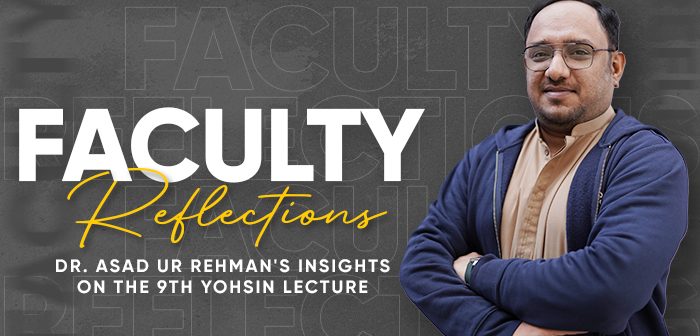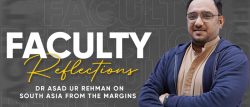Habib University’s Yohsin Lecture is a prestigious platform for thoughtful intellectual engagement, bringing to Pakistan leading international scholars whose work has wide-ranging impact and represents excellence in their field. As Pakistan’s premier liberal arts and sciences university, Habib University is committed to fostering dialogues addressing global and regional challenges. This year, Dr. Thomas Blom Hansen served as the speaker for the ninth Yohsin Lecture. The Reliance-Dhirubhai Ambani Professor of Anthropology, Dr Hansen also founded and directed Stanford University’s Center for South Asia.
Our Faculty Reflections series highlights perspectives from our faculty on various academic events and topics, serving as a platform for faculty to share their wisdom and insights with the wider community. This piece features Professor Asad Ur Rehman, Assistant Professor in our Social Development and Policy program.
Dr Asad Ur Rehman has contributed to the field of politics, social change, electoral studies and local government devolution in Pakistan. His flourishing academic career has honed his expertise in political theory, governance, and policy development. With a PhD in Political Studies, his research centers on the intricate dynamics of politics, development, and social change in contemporary Pakistan.
Read on to learn about Professor Asad Ur Rehman’s views on the 9th Yohsin lecture which explored the historical evolution of authoritarian ideologies, tracing their roots in the early 20th century to their resurgence in contemporary global and South Asian politics.
Modernity and resentment (or ressentiment) share a deep and intertwined history. This relationship began to take shape following the consolidation of the French Republic but became more pronounced at the turn of the 20th century, at the fin de siècle. The collapse of empires in Eurasia further fueled collective resentment, paving the way for the rise of nationalist political movements in the first half of the 20th century. This politics produced a dangerous cocktail of racism, war, and authoritarianism. As we entered the 21st century, we saw little deviation from this pattern. A globally integrated world has witnessed transnational conflicts (such as the “War on Terror”), social movements (such as the Arab Spring), and the rise of right-wing nationalism, all of which echo the politics of the early 20th century.
Dr. Thomas Hansen’s insightful lecture drew a comparison between these two historical epochs, revealing both uncanny similarities and notable differences. While it is tempting to interpret the present through the lens of the past, we must avoid reducing current realities to mere historical echoes. Dr. Hansen’s exploration of the rise of right-wing nationalism during the early 20th century helped deepen our understanding of how these ideologies shaped the liberal-postcolonial world order. Whether through the ‘scientific’ theories of racism, pseudo-mystical interpretations of vitalism, or the authoritarian delusions legitimized by moral ideologies of monism, the first four decades of the 20th century saw the convergence of these various streams of thought into a powerful political culture. This culture prioritized exclusion over inclusion, difference over shared humanity, and power over empathy. It connected individuals to ideologies that, rather than addressing real suffering, instead built upon feelings of ressentiment. Thus, giving rise to political projects which were anti-human and were perhaps the most brutal and inhumane expressions of modern politics. Even British India did not escape this trend and emergent politics of self-expression led to partition, ethnic cleansing, and large-scale human displacement.
The political cultures of today are, in some respects, eerily similar to those of the interwar period. The unfulfilled promises of social mobility and economic stability are once again generating feelings of despondency, desperation, and anger. Just as the decline of imperial peace in the late 19th century gave way to world wars, so too has the neoliberal dream of unlimited growth given way to a “polycrisis” of historic proportions, marked by climate catastrophe, war, and disease outbreaks. The politics emerging from this crisis exhibit striking parallels to those of the early 20th century.
However, while Dr. Hansen’s comparison provides invaluable insights into the continuities between these historical periods, it is equally important to recognize the unique characteristics of the present. Two key distinctions stand out in my view: the rise of social media platforms as new virtual battlegrounds for politics, and the democratization of the public sphere. The world today is more digitally interconnected than ever before, and the public sphere is more democratized. Yet, paradoxically, individuals are increasingly isolated, disconnected, and oblivious to one another. In this hyperreal world—where information is ubiquitous, yet ignorance often prevails—the politics of the present are shaped by a complex interplay of accessibility and ignorance. Understanding this paradox is crucial for making sense of the culture in which we now live, one that seems more informed but, in many ways, less aware.
Dr. Hansen’s lecture provides a vital framework for understanding the cyclical nature of history, but it also challenges us to think critically about the profound changes and complexities that define our current moment. The lecture explored the historical roots of resentment and authoritarianism but little discussed today’s globalized, digital, and increasingly fragmented world.
Read about the full 9th Yohsin Lecture here: 9th Yohsin Lecture 2024 at Habib featuring Dr. Thomas Hansen
Read our previous Faculty Reflections piece here: Inaugural Lecture of the Lady Fatima Endowed Chair at Habib University: Faculty Insights




